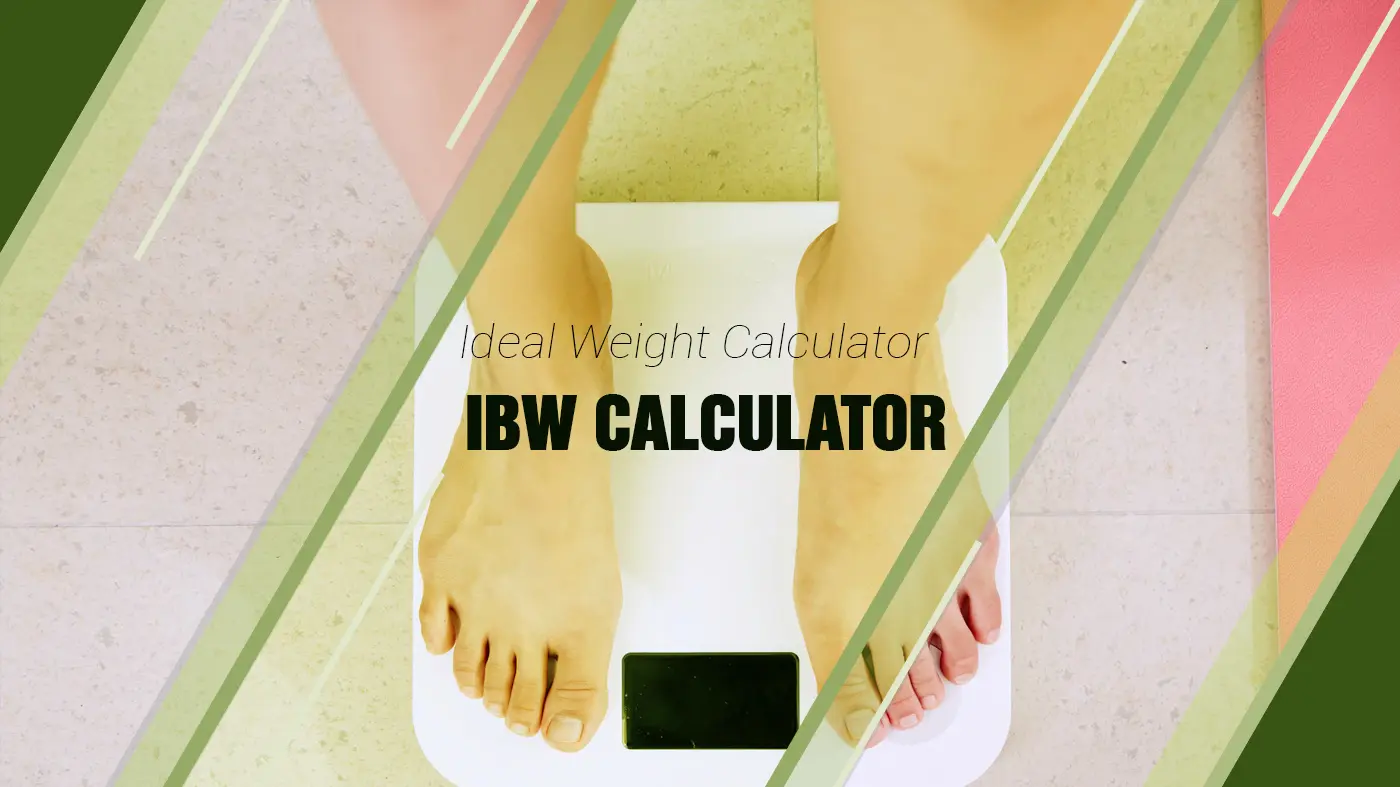The ideal weight calculator is a perfect tool to estimate the ideal body weight (IBW) for an individual based on gender and height.
Ideal Body Weight Calculator
Ideal Body Weight (IBW) Results:
The “ideal” weight for someone really depends on a few factors as there are several different body types.
For example, one person of a certain height may be heavily-muscled with denser bones and low body fat, so they may exceed their ideal weight estimate. This could be considered a generally healthy body composition.
On the other hand, someone else may have a very high body fat percentage but still weigh within the range or the exact weight. So unless body fat is measured and/or the individual exceeds an ideal weight excessively, the numbers can vary and aren’t always entirely reliable.
Therefore, a BMI or body mass index (a person’s weight in kilograms divided by the square of height in meters) range may be better than other formulas used to calculate ideal body weight. (1)
For instance, using the BMI range option for a 6-foot male will generate an ideal body weight range of between 136.408 lbs and 183.597 lbs. This gives a rather decent range to fall within. But then if you were to select the Broca formula rather than BMI range, you’d get an ideal body weight of 164.447 lbs.
The latter is much more specific and doesn’t allow for much room to work with. Additionally, this isn’t necessarily “the best” weight for every male that is 6-foot tall. This calculator uses several other equations that’ll give a unique estimate similarly.
But if you want a general estimate to ensure you’re at a healthy height, then the various formulas of the ideal body weight calculator might be a helpful resource for you.
The formulas/equations used for the ideal body weight calculator include:
- BMI range equation – estimated based on body mass index
- The Broca equation – benchmark formula developed in 1871 by French Surgeon Dr. P.P. Broca that paved the way for other equations
- The Robinson equation – Developed in1983 Dr. JD Robinson and Dr. DR Miller published a modification to the Devine formula
- The Devine equation – Developed in 1974 by Dr. BJ Devine. This equation was intended to determine dosages of certain medicines
- The Miller equation – Dr. DR Miller published a modification to the Devine formula in 1983
- The Hamwi equation – The Hamwi equation is similar to the Devine formula in that it was developed for determining the dosages in medications
- The Lemmens equation – Developed in 2005, Harry Lemmens came up with a more updated equation to address potential flaws from previous formulas
How to use the ideal body weight calculator
It’s a very simple tool to use. Simply choose the preferred unit of measurement. Then select your gender and height, and finally, pick the equation/formula you want to use and hit calculate!
If you’re curious about the different formulas, go down the list and see how each one affects your results.
Below, you’ll find the formulas for each equation used in the ideal body weight calculator…
BMI range equation
IBWmin [kg] = (18.5 / 703) × height[in] 2
IBWmax [kg] = (24.9 / 703) × height[in] 2
The Broca equation
Men: IBW [kg] = (height[cm] – 100) – ((height[cm] – 100) × 10%)
The Robinson equation
Men: IBW [kg] = 52 kg + 1.9 kg × (height[in] – 60)
The Devine equation
Men: IBW [kg] = 50 kg + 2.3 kg × (height[in] – 60)
The Miller equation
Men: IBW [kg] = 56.2 kg + 1.41 kg × (height[in] – 60)
The Hamwi equation
Men: IBW [kg] = 48 kg + 2.7 kg × (height[in] – 60)
The Lemmens equation
Which equation is most accurate?
The BMI range equation is definitely most ideal as it provides a body weight range as mentioned previously. Two people of the same height can look a lot different than each other depending on their body type.
Although, BMI doesn’t take into consideration body fat levels or health, but neither do any of the other formulas. (1)
However, research has shown these other equations to have clinical validity and utility where simplicity and practicality are preferred.
In fact, one scientific review found that the Broca equation is actually similarly accurate for estimating ideal body weight when compared to the more complex Robinson equation and the Hammond equation (not used in the ideal body weight calculator). (2)
And then one piece of research concluded that the Robinson equation turned out to be a superior method for calculating ideal weights in men. However, no formula was as accurate for women similarly. As a result, it was determined that it might be more useful to use BMI ranges instead of IBW formulas for men and women. (3)
So, we think most would agree that BMI range is likely the most accurate method for determining ideal body weight. It also just makes the most sense based on what we know about body types.
How can I tell if I’m at an ideal body weight?
The ideal body weight calculator is a decent tool for the purpose of determining a relatively appropriate weight. However, most people can simply look in the mirror and see whether they are unhealthily thin or have too much body fat.
No calculator will be able to give you a better estimate than what you can see and most often what the scale reads.

It’s not to say you should obsess over your weight or develop an unhealthy relationship with food to achieve a different look. But with a good exercise regime, a healthy, nutritious diet, and ensuring you’re living with minimal stress, anyone can attain a healthy and attractive-looking body.
Just make sure to track your calories and eat a proper ratio of healthy macronutrients from quality sources to ensure you reach your weight and body composition goals. And we have plenty of great resources on our site regarding diet and exercise information.
Although, you can definitely get your body fat levels checked and your waist measured. These are common methods used to determine good health, although, there are just too many factors that can determine how healthy an individual is or will be.
Also, keep in mind, women will typically have a higher body fat percentage than men which is simply biological. Not to mention, women also have a larger amount of healthier fat stores. (4)
ACE (American Council on Exercise) has a table with body fat recommendations for men and women which you can see below.
Ideal Body Fat Recommendations
| Description | Women | Men |
| Essential Fat | 10-13% | 2-5% |
| Athletes | 14-20% | 6-13% |
| Fitness | 21-24% | 14-17% |
| Acceptable | 25-31% | 18-24% |
| Obesity | >32% | >25% |
Having too low or high of a body fat percentage can be detrimental to your health. Excessively low body fat can interfere with your body’s natural processes (e.g. hormones, cell health, etc) as you need a certain amount of fat for many functions. Fat is a macronutrient along with protein and carbs which means the body needs it in higher amounts than other nutrients.
Then on the opposite end, too much body fat in general or visceral fat (fat stored in the belly and around organs) is a risk factor for diabetes, heart disease, cancer, stroke, and artery disease.
So, don’t just aim for a certain bodyweight… strive to make lifestyle choices that’ll ensure you’re healthy inside and out.
Tip: If you're signed in to Google, tap Follow.









